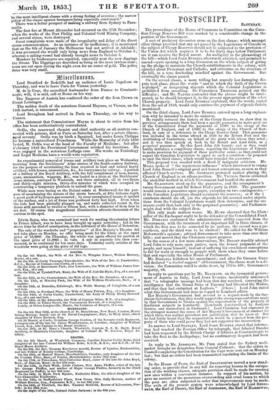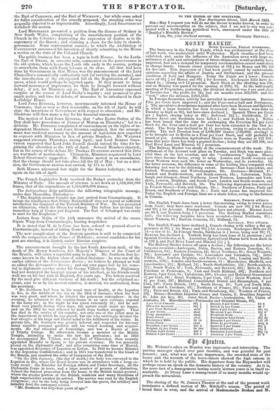POSTSCRIPT.
SATURDAY.
The proceedings of the House of Commons in Committee on the Cana- dian Clergy Reserves Bill were marked by a considerable change in the position of the Government.
A sort of prefatory discussion arose on the first clause ; which amongst other things provided that any act passed by the Legislature of Canada on the subject of Clergy Reserves should not be subjected to the provision of the Union Act which requires it to be for thirty days before Parliament ere it can receive the Royal assent. An ambiguity in the phraseology of the bill—which Lord JOUN RUSSELL afterwards admitted, and promised to amend—gave opening to a long discussion on the whole subject of giving up the pledge to maintain the Church-establishments in the colony, with episodes about Protestant and Catholic, and criticisms on the structure of the bill, in a tone foreboding mischief against the Government. But eventually the clause passed. On the second clause, a more trifling but scarcely less damaging dis- pute took place, about the words "and to which the faith of the Crown is pledged," as designating stipends which the Colonial Legislature is prohibited from annulling. Sir FRRDERICK Tnrammit pointed out the difficulty ; and Mr. NAPIER contended that the phrase might be inter- preted, as he should interpret it, to the present appropriation of the whok Church property. Lord Jonig RUSSELL explained, that the words, copied from the act of 1840, would only continue the payment of stipends therein mentioned.
On the third clause, Lord JOHN RUSSELL entered upon a long explana- tion why he intended to move its omission. He rapidly retraced the history of the Clergy Reserves, to show that in previous arrangements there had been a specific guarantee to make good out of the Consolidated Fund the payments of 77001. to the clergy of the Church of England, and of 15801. to the clergy of the Church or Scot- land, in case of a deficiency in the Clergy Reserve fund. That guarantee was included in the terms offered in 1840 by Sir Robert Peel and the Archbishop of Canterbury, on behalf of the party with whom they acted ; and it was then spoken of, both by Sir Robert and Lord John, as a perpetual guarantee. By this Lord John felt bound ; and as they could hardly introduce a compulsory clause, requiring the Legislature of Canada to make provision for payment of those particular sums—as thev,could not expect the Canadian Legislature to agree to such a condition—lie proposed to omit the third clause, which would have repealed the guarantee. This proposal was assailed with a flood of indignant criticism. Mr. Mutt spoke of "the mysterious influence" which intervened to cramp Lord John Russell's original good and honest conceptions, as soon as they affected Church matters. Mr. ADDERLEY protested against placinf the Church of England in an odious position. Mr. VERNON SMITH criticized the unskilful method in which Government had handled the matter.
Mr. Gnmasreeen stood up for the guarantee, and the arrangement b tween Government and Sir Robert Peel's party in 1840. The guarante would remain a guarantee upon paper, excepting on two contingencies,— if the Canadian Legislature should secularize the reserves; or if the i cumbents should die off, [as the stipends for life scoured under stipule tions from the Colonial Legislature would then determine, and the sue eessors could then look only to the perpetual guarantee]: and Parliamen might deal with the subject then.
This only made matters worse. Mr. HUME observed that the Chan- cellor of the Exchequer ought to be the defender of the Consolidated Fund Mr. Disns ELI contrasted the administrative ability expected from the Government, with the treatment of an important bill in three clauses, ot which the first was to be corrected by its authors, the second was a pa- renthesis, and the third was to be omitted ! He called for Sir William Molesworth's opinion ; advised Government to take more time over their bills ; and moved that the Chairman report progress. In the course of a few more observations, Mr. BRIGHT sturdily advised Lord John to rely more upon justice, upon the honest judgment of the people and upon himself; instead of suffering his own honest conceptions to fail:for want of strength to grapple with them when they came before that and especially the other House of Parliament. Mr. DISRAELI withdrew his amendment ; and after Sir Gramm GREY had declared "a limited support" of Government, the clause went to a di- vision: the Committee voted to strike it out, by 176 to 108; Government majority, 68.
In reply to questions put by Mr. Brake-KETT, on the tyrannical govern- ment of Austria in Italy, Lord Rats Lc ssELL incidentally announced that "a telegraphic message had been that day received, conveying the intelligence that the Grand Duke of Tuscany had liberated the Madiai, and that they had embarked at Leghorn." (Cheers.) Lord John stated what this Government had done in regard to Lombard affairs.
Her Majesty's Government had acceded to a request made by the Sar- dinian Government, that they would support the strong representations made by that Government to Vienna against the sequestration of the property of
Sardinian subjects in Lombardy. [Lombards denaturalized by Austrian licence, and naturalized in Piedmont.] Lord Clarendon had expressed in the strongest manner the sense of her Majesty's Government at conduct for which there was neither precedent nor justification that he knew of. But he had lately heard that the sequestration would be removed from the pro- perty of those who could prove they had not supported the insurrection.
In answer to Lord STANLEY, Lord JOHN RUSSELL stated that informa- tion had reached the Foreign Office by telegraph, that Admiral Dundas had been requested by the British Charge d'Affaires at Constantinople to take the fleet to the Archipelago; but no confirmatory despatch had been received.
In reply to Mr. ADDERLEY, Mr. PEEL stated that the Sydney mail- packet brought no despatches from General Cathcart ; that the orders in Council completing the Constitution for the Cape were sent out on Monday last ; but that no orders had been transmitted regulating the limits of the colony.
In the House of Peers, the Earl of SHAFTESBURY moved a new stand- ing order, to provide that in any bill for removing houses in the occupa- tion of the working classes, adequate provision shall be made for erecting new ones within a convenient distance. In support of his motion, he gave an account of the monstrous overcrowding and cruel losses to which the poor are often subjected in order that improvements may be made. The evils of the present system were acknowledged by Lord REDES- DALE, the Earl of Dimly, the Earl of ABERDEEN, the Earl of ILtanowar, the Earl of CARLISLE, and the Earl of WICKLOW ; but while some asked for fuller consideration of the remedy proposed, the standing order was geuerally objected to as impracticable. Accordingly, Lord Sus.rressusix withdrew the motion.
Lord MONTRADLE presented a petition from the diocese of Sydney in New South Wales, complaining of the unsatisfactory position of the Church in the Colonies ; deprecating the expression of doubts as to the supremacy of the Queen ; and claiming a share for the laity in church- government. Seine conversation ensued ; in which the Archbishop of Cammannav announced his intention of shortly submitting to the House a motion on the state of the Colonial Church.
The public business has been a topic in both Houses. In the Lords, the Earl of DERBY, in sarcastic vein, commented on the perseverance in the old system, which keeps the Lords idle early in the session, perhaps to overwhelm them with hasty labours at its close. All that had been done by Government in that House was the announcement of the Lord Chancellor's romantically enthusiastic task [of revising the statutes]' and the introduction of the oft-rejected bill on the Registration of Assur- ances, which would perhaps be rejected again. If they meant to bring forward measures of importance, let them be brought forward without delay; if not, let Ministers say so. The Earl of ABERDEEN expressed surprise at the course of Lord Derby's inquiry ; and promised to give ample notice, and time for debate, of measures to be introduced in their Lordships' louse. Lord Joim RUSSELL, however, spontaneously informed the House of Commons, that as soon as they reassemble, on the 4th of April, he will state the intentions of Government with respect to education ; and Mr. Gladstone will then name a day for his financial statement.
The motion of Lord Jaws RUSSELL, that "after Easter Orders of the Day shall have precedence of Notices of Motion on Thursdays," led to a division. Mr. DISRAELI complained of encroachment on the rights of in- dependent Members. Lord JOHN RUSSELL explained, that the arrange- ment was rendered necessary by the amount of legislation now expected to originate with Ministers in lieu of private Members. Mr. WALPOLE suggested alternate Thursdays during April ; and Lord ROBERT GROS- VENOR suggested that Lord John Russell should extend the time for be- ginning the alteration to the 18th of April. Several Members objected ; but in the course of the debate Mr. Tuccuss DeNcosme avowed that little use war made of motion-days. Ultimately, Ministers acquiesced in Lord Robert Grosvenor's suggestion. Mr. DEEDES moved as an amendment, that the change should not take place till the 2d of May ; but on a divi- sion, the Government motion was carried, by 171 to 139.
Both Houses adjourned last night for the Easter holydays ; to meet again on the 4th of April.



























 Previous page
Previous page